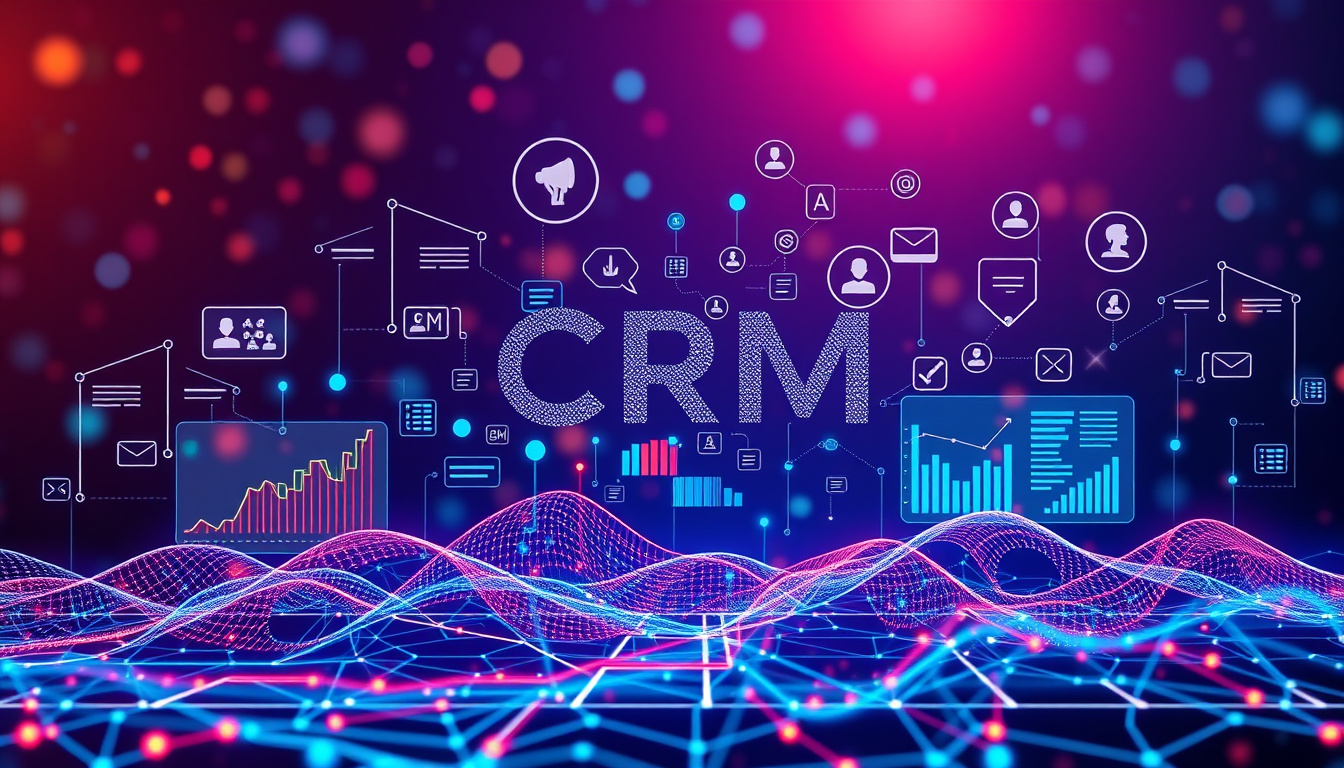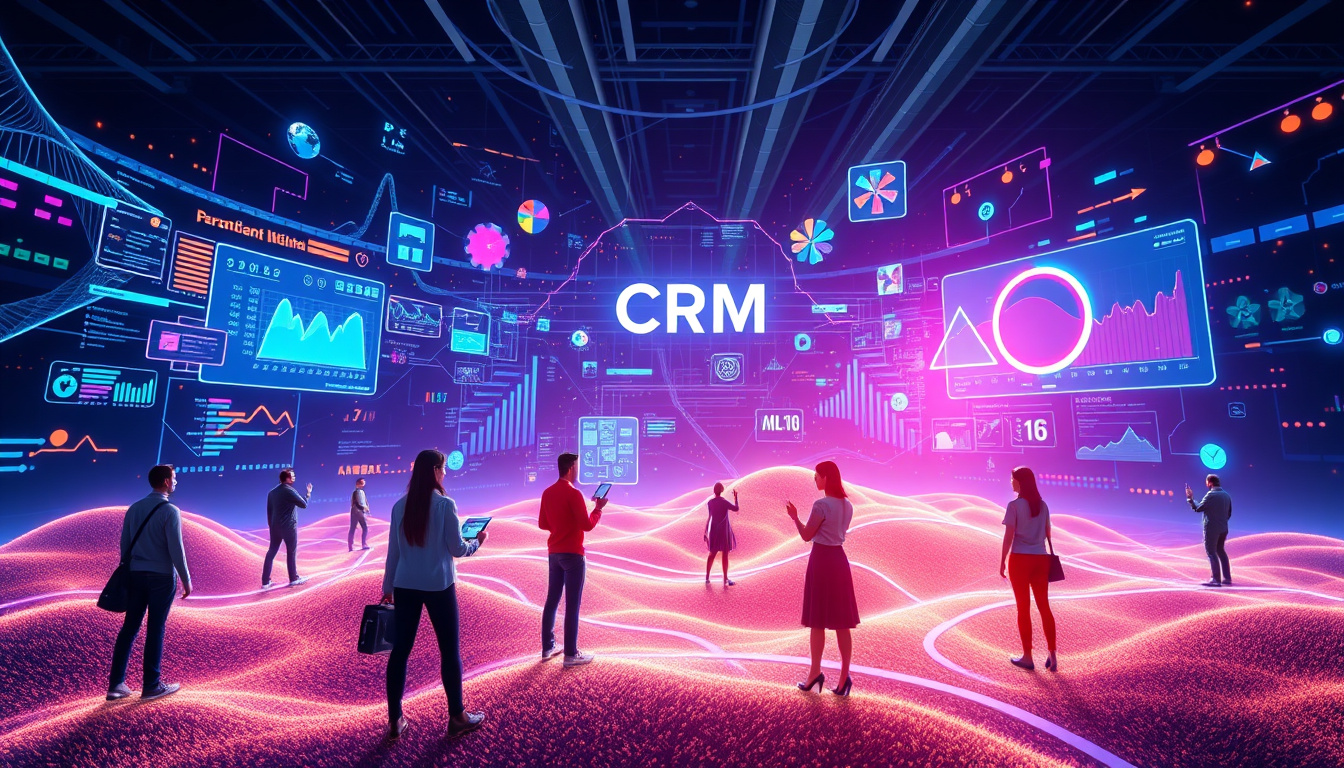✅ Using CRM Data for Personalization (Don't Miss This!)

In today's dynamic marketing landscape, customer expectations have soared, making personalization a critical strategy for brands aiming to stand out. ✅ Using CRM Data for Personalization (Don't Miss This!) is more than just a catchy phrase; it's a fundamental approach that enables companies to tailor their interactions based on individual customer preferences and behaviors. By harnessing the power of Customer Relationship Management (CRM) data, businesses can create meaningful connections with their customers, improve engagement, and drive sales. In this article, we'll explore what CRM data is, why personalization matters in marketing, the key types of CRM data to consider, and the best practices for effectively using this data to craft personalized experiences that resonate with your audience.

Key Takeaways
- CRM data enables targeted marketing strategies that enhance customer engagement.
- Personalization increases customer satisfaction and loyalty by addressing individual needs.
- Key types of CRM data include demographics, purchase history, and customer interactions.
- Effective analysis of CRM data is crucial for deriving actionable insights for personalization.
- Successful brands demonstrate the impactful use of CRM data in personalizing their marketing efforts.
Introduction to CRM Data and Personalization
In today's competitive business landscape, understanding your customer's needs and preferences is paramount. That's where ✅ using CRM data for personalization comes into play. Customer Relationship Management (CRM) systems are designed to gather a wealth of information about your clients, from their purchase history and interactions with your brand to personal preferences and demographic details. By harnessing this information, businesses can craft personalized marketing strategies that resonate with individual customers, ultimately leading to enhanced customer loyalty and increased sales. In this article, we will explore the significance of CRM data in creating tailored experiences, the best practices for leveraging this data effectively, and the technologies available to streamline the personalization process.
Understanding the Importance of Personalization in Marketing
In today's competitive market, understanding the importance of personalization in marketing is crucial for businesses aiming to stand out and engage effectively with their customers. By leveraging CRM data for personalization (don't miss this!), companies can create targeted campaigns that resonate with their audience on a deeper level. CRM systems compile customer information, allowing marketers to analyze behavior, preferences, and past interactions. This data can inform tailored messaging and offers that meet individual customer needs, enhancing the overall consumer experience. As consumers increasingly expect personalized communications, utilizing CRM data becomes not just an advantage, but a necessity. Brands that excel in personalization are likely to foster stronger customer relationships, increase loyalty, and ultimately boost sales.
'The best marketing doesn’t feel like marketing.' – Tom Fishburne

Key Types of CRM Data for Personalization
In today's competitive market, using CRM data for personalization (don't miss this!) has emerged as a crucial strategy for businesses aiming to enhance customer experience and drive loyalty. Understanding the key types of CRM data enables organizations to tailor their communication and offerings effectively. First and foremost, demographic data, such as age, gender, and location, provides insights into customer preferences and behaviors. Next, behavioral data, which tracks interactions customers have with your brand—like website visits, email opens, and purchase history—can reveal patterns that inform personalized marketing efforts. Additionally, transactional data is critical; it not only includes the details of customer purchases but also the timing and frequency of those transactions. Lastly, customer feedback gathered from surveys and reviews offers valuable qualitative insights that can refine personalization strategies. Combining these data types allows businesses to create a more tailored approach, ensuring that customers receive relevant content and promotions that resonate with their individual needs.
How to Analyze CRM Data Effectively
In today's competitive market, understanding customer preferences and behaviors is critical for success. ✅ Using CRM Data for Personalization (Don't Miss This!) involves a meticulous analysis of customer relationship management (CRM) data to create tailored experiences that resonate with your audience. Start by categorizing your data into distinct segments based on demographics, purchasing behavior, and interactions with your brand. Utilize analytical tools to uncover insights from these categories, enabling your marketing team to craft personalized messages and offers. Visual analytics can also enhance this process, providing an intuitive way to interpret complex datasets. Additionally, frequently revisiting your analysis allows you to adapt to shifting consumer trends, ensuring your personalization strategies remain effective. By harnessing the power of CRM data effectively, businesses can not only foster stronger customer relationships but also boost engagement and loyalty.

Best Practices for Using CRM Data in Personalization
Using CRM data for personalization is becoming increasingly essential in today's competitive landscape. Businesses that effectively leverage customer relationship management data can tailor their communications and offerings to meet the specific needs of their audience. To optimize your use of CRM data for this purpose, start by segmenting your audience based on behavior, demographics, and purchasing history. This allows for more targeted messaging that resonates with individual preferences. Additionally, regularly updating and maintaining your CRM database ensures that your insights remain relevant and accurate. Incorporate automated tools that utilize AI and machine learning to analyze this data, enabling real-time personalization at scale. Finally, remember to measure the impact of your personalization efforts by tracking metrics such as customer engagement and conversion rates, which can guide future strategies. By implementing these best practices, you can enhance customer experience and foster deeper connections through effective personalization.
Case Studies: Successful Brands Using CRM Data
In today's highly competitive market, successful brands are increasingly leveraging CRM data for personalization to enhance customer relations and drive sales. Major players like Amazon and Netflix exemplify this trend, using detailed customer data to create tailored user experiences that resonate with individual preferences. For instance, Amazon's recommendation system, powered by CRM insights, not only suggests products based on past purchases but also incorporates browsing behavior and review history, culminating in a highly personalized shopping experience. Similarly, Netflix employs CRM data by analyzing viewing habits to curate recommendations that keep users engaged and subscribed. By harnessing CRM analytics, these brands not only promote customer loyalty but also significantly boost their overall revenue. Don't miss this opportunity to understand how using CRM data for personalization can transform your business strategies and enhance customer satisfaction!

Conclusion: The Future of CRM Data and Personalization
In conclusion, the future of CRM data and personalization is undoubtedly intertwined, presenting businesses with unparalleled opportunities to enhance customer engagement and retention. ✅ Using CRM data for personalization allows companies to tailor their marketing strategies to individual preferences and behaviors, leading to more meaningful interactions. As technology evolves, organizations can leverage advanced analytics, AI, and machine learning to extract insights from vast amounts of customer data, enabling hyper-personalized experiences. Companies that invest in robust CRM systems and focus on data-driven personalization will not only meet the ever-changing expectations of consumers but also gain a competitive edge in their respective industries. Embracing this trend is essential for businesses aiming to foster loyalty and drive sales in the fast-paced market landscape.
Frequently Asked Questions
What is CRM data and how does it relate to personalization?
CRM data refers to the information collected through Customer Relationship Management systems, which can include customer demographics, buying behavior, and interactions. This data is crucial for personalization as it helps businesses tailor their marketing efforts to meet the unique needs and preferences of individual customers.
Why is personalization important in marketing?
Personalization is important because it enhances customer experience, boosts engagement, and increases conversion rates. Customers are more likely to respond positively to marketing messages that feel customized to their specific interests and needs.
What types of CRM data can be used for personalization?
Key types of CRM data for personalization include demographic information, purchase history, customer feedback, website interactions, and social media activity. Each of these can provide valuable insights into customer preferences and behaviors.
How can businesses effectively analyze CRM data for personalization?
Businesses can analyze CRM data by employing data analytics tools to identify trends and patterns. Segmentation of customers based on different criteria is also important, as it allows for targeted marketing strategies that cater to specific customer groups.
Can you provide an example of a brand successfully using CRM data for personalization?
Sure! Brands like Amazon and Netflix utilize CRM data extensively to personalize customer experiences. Amazon recommends products based on past purchases and browsing history, while Netflix curates show suggestions tailored to individual viewing habits, leading to higher customer satisfaction and retention.
Authored by - Abdulla Basha
Email id - mail@abdullabasha.com
Linkedin